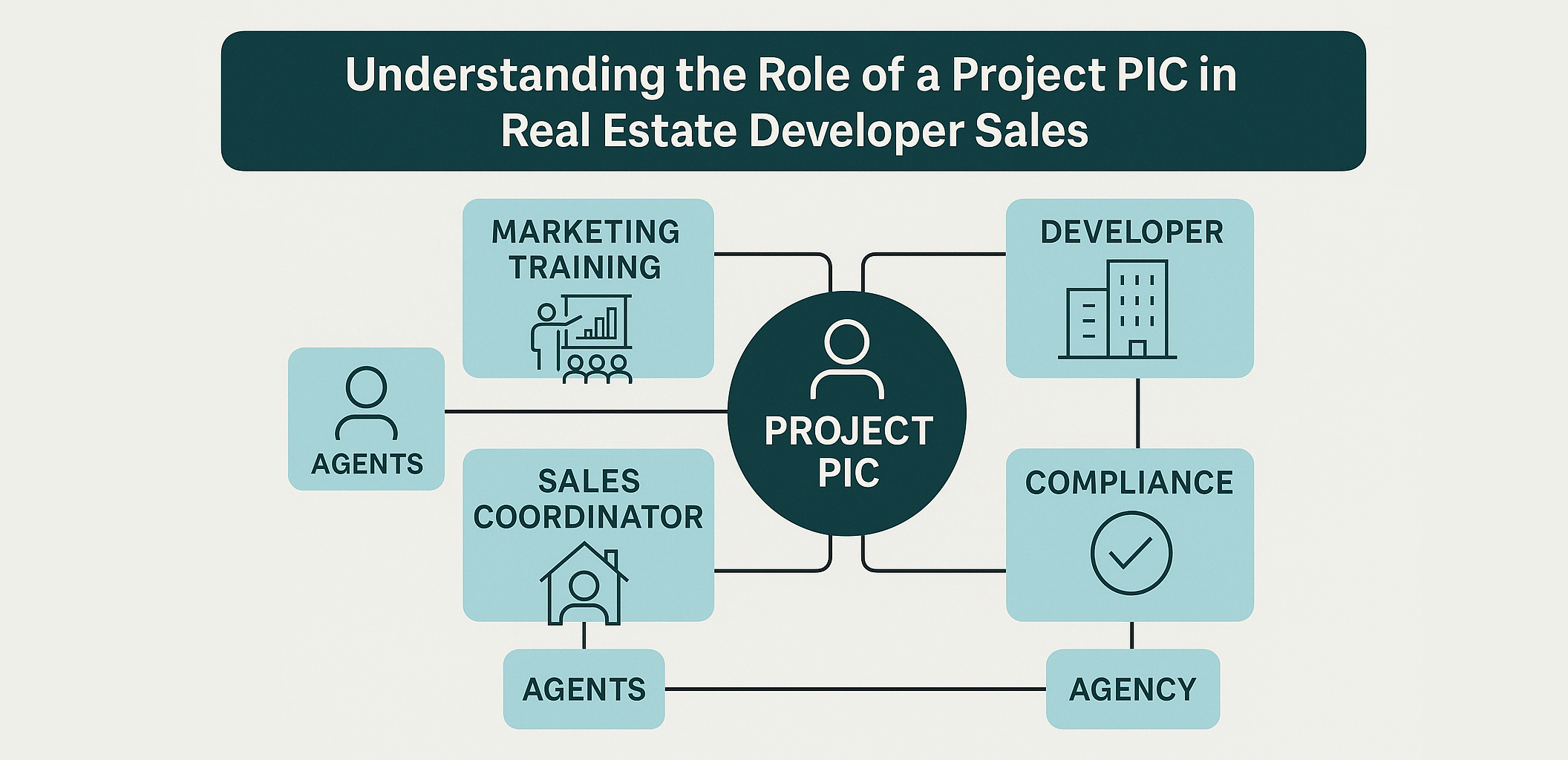Understanding the Role of a Project PIC in Real Estate Developer Sales

In Malaysia’s project-marketing scene, one role quietly drives most developer sales operations — the Project PIC, short for Person-in-Charge.
They sit at the intersection of developer, agency, and agent, ensuring every unit, brochure, and buyer enquiry moves through a compliant and coordinated pipeline. While most agents chase deals, the PIC’s job is to make sure those deals actually close.
1 · What Is a Project PIC?
A Project PIC acts as the bridge between the developer and the many agents selling a project. They coordinate all sales activities, handle agent inquiries, monitor compliance, and support marketing execution.
In developer sales teams, the PIC is effectively the sales project manager. Their responsibilities typically include:
- Coordinating sales between the developer and external agencies.
- Providing marketing and product training to agents.
- Acting as sales coordinator, ensuring units are booked, allocated, and tracked properly.
- Managing documentation compliance — such as booking forms, approval flows, and commission eligibility.
- Serving as the information hub — if an agent lacks info or faces issues, the PIC is the first person they contact.
In short, they keep the developer sales ecosystem running smoothly and transparently.
2 · How the PIC Is Paid
Unlike traditional staff roles, a Project PIC’s income is usually performance-based. They earn a fixed percentage commission once a transaction successfully closes.
This “success-basis” structure means:
- The PIC only earns when the agent closes a deal.
- The more deals their agents close, the higher their total commission.
- Their motivation aligns directly with the agency’s sales success.
Because of this, many PICs are in-house agents assigned to manage a specific developer project. They receive a cut of every sale handled through their coordination — regardless of which external agent brought in the buyer.
3 · Why Many Agents Aspire to Become PICs
Being a Project PIC is considered one of the most stable and respected positions within the agency structure.
Here’s why:
- Guaranteed Pipeline – Since every agent working on the project reports through the PIC, they naturally share in multiple transactions.
- Sure-Earn Position – Even if they didn’t close the deal personally, they earn a small share from every successful sale under their supervision.
- Recognition and Access – PICs work directly with developers, gaining deeper project knowledge and priority access to new listings.
- Influence – They shape marketing strategy, control unit allocation, and often manage agent approvals — giving them significant internal influence.
For many experienced negotiators, becoming a PIC is the next step toward leadership and consistent income stability.
4 · The PIC’s Strategic Value to Developers and Agencies
From a developer’s perspective, the PIC ensures:
- Consistent messaging in all marketing materials.
- Smooth coordination between multiple agencies.
- Accurate updates on bookings, cancellations, and buyer progress.
- Compliance assurance, reducing risk of misrepresentation or documentation errors.
From an agency’s perspective, the PIC serves as:
- The project gatekeeper, ensuring fairness and information transparency.
- The motivator, helping external agents close deals faster through training and quick support.
- The liaison, ensuring developer payments and commission claims move correctly.
In essence, the PIC converts what could be chaos — hundreds of agents across multiple agencies selling one project — into a coordinated, trackable sales machine.
5 · The Downside of the PIC Model
While the role is lucrative, it’s not without challenges:
- High Pressure: Developers and agents both rely on the PIC to hit targets.
- Long Hours: Weekends and late-night coordination are common during project launches.
- Conflict Management: Balancing developer expectations with agent interests requires diplomacy.
- Limited Personal Sales: PICs often spend more time managing others than closing their own deals.
However, for many, the trade-off is worth it — steady income, industry credibility, and long-term relationships with developers.
6 · The Future of PICs in a Platform-Driven Ecosystem
As the real estate industry shifts toward digital coordination platforms, the PIC role is also evolving. Instead of managing everything manually through chat groups and spreadsheets, modern ERPs like ListingMine ERP allow:
- Commission distribution with embedded PIC-share rules.
- Transparent tracking of which agent closed which buyer.
- Real-time dashboards for developer and agency reporting.
This technology doesn’t replace PICs — it amplifies their efficiency. By freeing them from administrative bottlenecks, they can focus on what truly matters: training agents and driving conversions.
Final Thought
The Project PIC is the unsung backbone of Malaysia’s project-marketing ecosystem. They are part coordinator, part trainer, part compliance officer — and entirely results-driven.
Their success-based commission structure turns them into the ultimate sales enablers: the faster agents close deals, the faster the PIC earns.
In a market where every transaction counts, the PIC is not just a role — it’s a growth multiplier. And as technology continues to evolve, their influence will only grow stronger.











































































































